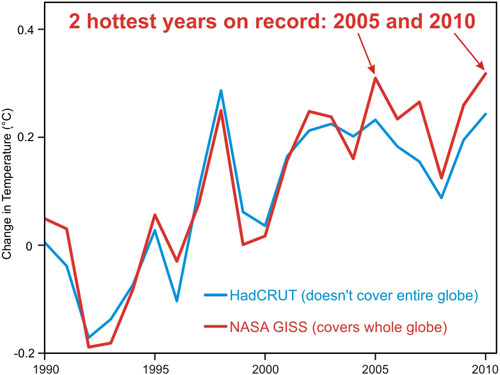Climate half-truths turn out to be whole lies
Posted on 28 June 2011 by John Cook
The Age have published an opinion piece I wrote in response to Bob Carter's An Inconvenient Fallacy. My response is Half the truth on emissions and explores how Carter uses half-truths and cherry picked data to mislead and distort climate science. I also included a graph that wasn't included in the article (either due to space or because it was just too geeky for a broadsheet). So I've included an excerpt plus the graph below:
To understand what's happening to the global climate, we need to look at temperature change over the entire planet. Two scientific teams - NASA Goddard Institute for Space Studies and the European Centre for Medium Range Weather Forecast - have constructed temperature records spanning the whole globe. Both find consistent results, using independent methods, with the two hottest years on record being 2010 and 2005. Both find the Arctic is warming faster than the rest of the planet, with melting sea ice acting as a positive feedback that amplifies the warming.
Enter Bob Carter and his deliberate brand of climate cherry-picking and false, but plausible, assertions. He has long hung his hat on the proposition the climate has been cooling since 1998. But with 2005 and 2010 being the hottest years on record, he resorts to cherry-picking which dataset to use. Rather than use temperature records that cover the entire globe, he opts for datasets that do not include the Arctic region, where warming is the strongest. These temperature records underestimate recent warming and are the darling of those who wish to deny global warming is happening.
Note: I've added the NASA comparison to HadCRUT graph to our ever growing list of Climate Graphics so a high-rez version, freely available under a Creative Commons licence, is now available for those not afraid to use geeky graphs.































 Arguments
Arguments































[DB] Long Gish Gallop snipped. Please see JMurphy's kind and instructive advice to you below.
Please also read and comply with this site's Comment Policy. Comments that do not get moderated.
- It's not how science has ever been done in the past. You are asking climate scientists to adopt a novel and untried approach to science on your unsupported advice.
- The universe of possible hypotheses is sufficiently large as to make science economically and practically un-viable if done according to your approach.
- Those who have offered credible opinions on how science should be done in the past (Bacon, Popper, Kuhn, Feyerabend and so on) have done so an the basis of years of study of the history of science, and have argued their case on the basis of that history. You have failed to do that.
Instead, the practical approach to science is very different, and far more effective in terms of cost and effort. First there is a search for pertinent facts. Then a hypothesis is created. The hypothesis is tested against the known data. If the hypothesis fits the data, it may either be accepted provisionally or additional predictions may be made on the basis of the hypothesis and new data obtained to further test it. If the hypothesis is considered credible, others will start building new hypotheses on top of it. Each of those will have consequences which can be tested. Every time we do a test, we get a chance to show one of our hypotheses is wrong. The problem might be the most recent hypothesis. It might be one for a while back, which has had lots of other hypotheses built on top of it. But the more we build on a wrong hypothesis, the sooner we find it is wrong. So actually, it is rather rare to go too far along a false direction. In other words, the way science is practised has several important features: - It is self-correcting, since we keep going back to the data, and the more fundamental a hypothesis is, the more it gets tested. - It is efficient, because we don't demand that a hypothesis be absolutely cut and dried before we start exploring possible consequences. - It is economical, because testing a subsidiary hypothesis provides additional tests of all the parent hypotheses. However your aim in suggesting how science should be done is a noble one. If you wish to pursue it further, then a good starting point would be to spend the next decade reading history and philosophy of science. I suggest you focus first on non-climate related areas, which are less clouded by political influences.[DB] Thank you for setting a good example!